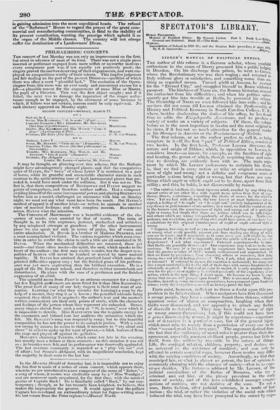PHILHARMONIC CONCERTS.
Tim concert of last Monday was not only an improvement on the first, but stood in advance of most of its kind. There was not a single piece inserted or performer engaged from mere selfish or unworthy motives ; every component part was, if not equally yet positively good; the singers proved themselves deserving of their engagements, and were em- ployed on Compositions worthy of their talents. This implies judgment and fair dealing on the part of the present Directors—qualities of which there was often a most " plentiful lack." The exclusion of the Opera- singers from this room was an ever ready and convenient excuse for a job—a plausible reason for the engagement of some Miss or Master, the pupil of a Director. This was the first object sought ; and if it failed, the next sras to damage the reputation of the singer unfor- tunate enough to be engaged, by the allotment of some business in -which, if failure was not certain, success could be only equivocal. No such trickery appeared on Monday night.
SECOND CONCERT—MONDAY, MARCH 18.
ACT I.
Sinfonia in A Bcrenoecx.
SOOOlt, MiSS RAO:FORT/I, " to :WOW " (neat) STOUR. Coneerto Pastorale (MS.) Pianoforte, Mr. MosemEr.es (first tone or perfivmanee) Mono v. us. Duetto, Miss Rats:sumo and MisA MAssoN, " Corn.' ti piace" dl Clemenza di Tit") MOZART. Overture, The Rider rf Spirdi; C. M. VON WEBER.
n.
Sinfonia, Letter T HAY,N.
Scotia, Mr. BENNETT, "Vicki ml sta" (Earyanthe) C. M. A'ON WEBER.
Concerto, Violin, Mr. DAvin (his first performance in
this country)
HAVE%
Terzetto. AI
BNFOIMI. Mio MASSL■N, tad MT. BENNETT, Pria di partir " (fdomenco) MozAwr. Overture., The Alchunlist STOUR-
Leader, Mr. Loom—Conductor, Mr. Porren.
It may be thought, on glancing over this scheme, that the Sinfonie might have advantageously changed places ; and that the comparative quiet of ILsynx, the " brass" of whose Letter T is restricted to a pair of horns, while its graceful and unexcitable character stands in such contrast to the spirit-stirring tone of both instrumental pieces that pre- ceded it, would have sunk under the collision. Bet it was not so. The fact is, that these compositions of Bineruovlist and HAYDN suggest no points of comparison, and therefore neither suffers. Dud a Composer
availing himselfof the same instrumental power, and placing BEETHOVEN before him as a model, challenged an encounter with him on Monday night, we need not say what must have been the result. But lavDN's
method of appeal is of another kind—or rather, he appeals to another class of musical feelings ; and with complete success. BEETHOVEN seises, HAYDN wins the attention.
The Concerto of MosenfmEst was a beautiful evidence of the elo- - qaence of music, even unaided by that of words. The train of thought is, as its title expresses, pastoral, unchecked and unbroken by any misplaced attempts at grandeur. Of the other instrumental piece we can speak not only in terms of praise, but of warm and entire admiration. M. DAVID is a brother of Madame Duteity.x, and a most accomplished violinist. The various requisites which must com- bine in order to confer the claim to such a title are all associated in M. DAVID. When the mechanical difficulties are mastered, there yet needs—and there often needs—the spirit, the soul, which speaks to the heart of the auditor : the first may excite wonder, but the deeper sym- pathies of hearers will never be reached or moved by mere manual rapidity. M. DAvin has attained that practised hand which makes the greatest difficulties appear easy ; but the finished grace of his perform- ance was yet more captivating than his brilliant execution. He is a pupil of the DE liertiov school, and theretbre neither mountebank nor distortionist. Ile plays with the vase of a gentleman and the finished expression of an artist.
The splendid scene from Faust is an arduous encounter for a singer ; but few English performers are more fitted for it than Miss IlaueronTn.
The great fault of many of our lady singers is their total want of ani- mation. Learning (or what they mistake for learning) a song by the help of a master, they sing it as a lesson ; the pencilled addenda being acquired, they think all is acquired ; the authors text and the master's written commentary are their only points of study, while the character and feelings of the person whom they represent are unheeded. Hence, many singers shrink from such a song as " Si, lo sento," over which it is impossible to dawdle. Miss lisixroam has the requisite energy for the, encounter, and infused into her auditors the animation which she felt. Mr. BENNETT's song was respectably sung; but to this beautiful composition he has not the power to do complete justice. With a voice not strong by nature, he seems to think it necessary to " cry aloud and shout "iii order to make up for want of power,—a trick borrowed from the stage and played off against the galleries. Mozster's ebariniers Terzetto, which came too late in the evening, has usually been a fbilure at these concerts : on this occasion it was not
so ; its beauties were felt, and its performauce was deservedly applauded. The last overture commonly is regarded as a " play 'on out" sort of affair ; but Sl'Olitt'S Akkyttlisi, With its magnificent conclusion, kept the majority in their seats to the last bar.


























 Previous page
Previous page